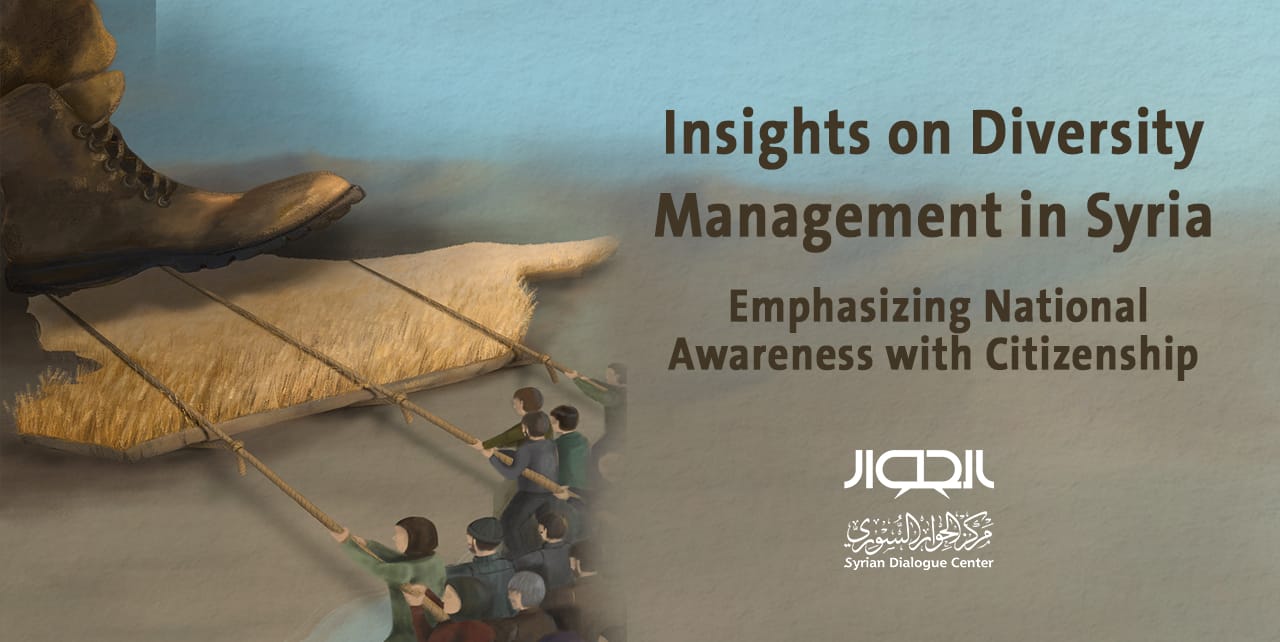
Insights on Diversity Management in Syria – Emphasizing National Awareness with Citizenship
Abstract:
This paper attempts to shed light on the reality, management, and challenges of diversity in Syria, as well as the future opportunities that can be worked on. It utilizes the descriptive-analytical method and the comparative approach.
Diversity management in any diverse society is a crucial issue in building a cohesive national identity. Without effective management, diversity can become a divisive factor. Some countries have succeeded in turning their diversity into a source of strength, as exemplified by the Malaysian and Canadian experiences focused on in this paper.
In the Syrian case, ethnic, sectarian, and religious diversity was not inherently a negative factor hindering peaceful coexistence among different components. However, various other factors contributed to the failure of managing diversity, including the policies pursued by the state. Starting from the French mandate and the discriminatory policies it adopted, and after that the Assad regime continuing to destroy this diversity through a multifaceted set of political, social, and cultural policies, resulting in increased social fractures among different components.
The paper consists of seven axes. The first and second axes serve as theoretical and introductory frameworks to the topic, discussing the tools of diversity management and their application in the Malaysian and Canadian experiences. The Malaysian experience focused on inclusive tools through a coalition governance model, while the Canadian experience primarily emphasized tools targeting society, such as education and public participation.
The third axis highlights the reality of diversity in Syrian society from the perspective of the relationship between the public and private domains. It reveals the depth of the crisis in political diversity, which gradually disappeared from the public sphere, while ethnic and religious diversities had relatively more freedom in the public domain, albeit not actively encouraged.
The fourth axis discusses the demands of Syrian “minorities”, emphasizing that they focus more on identity than on demands relating to the political system’s policies regarding service distribution. Their focus lies in attempting to gain concessions from the “majority”, especially regarding the notions of Arabness and Islam, which historically formed the core components of the Syrian collective identity.
The fifth axis details the factors contributing to the failure of Syrian diversity management, including the absence of a genuine national character in the state, the issue of elites, the weakness of intermediary institutions, and external conditions. The paper explains that the “minority consciousness” fuelled and perpetuated by foreign interventions has directly influenced the majority’s adoption of a “minority-like” mindset, seeking equality with other components through “de facto sectarian quota”.
The sixth axis highlights the efforts of diversity management undertaken by the revolutionary and opposition forces, which were more in appearance for various reasons, primarily due to the thematic context. Despite this, attempts were made to focus on discourse and power-sharing tools within the available margin, although there was a clear weakness in making significant contributions to the public culture that emphasizes national identity rather than elitist discourse.
The seventh and final axis focuses on the steps that can be taken to improve diversity management on the national level. It emphasizes that achieving a political transition that helps overcome the Assad regime, the primary cause of diversity management failure, is a necessary but insufficient condition. Following that, a suitable space can be provided for the Syrian society and Syrian elites to find effective solutions to the problems related to “minorities” and sectarianism. This can be accomplished through various tools, including emphasizing shared social culture and subsequently addressing legal clauses that have played a negative role in this regard.
The study recommends directing educational institutions and universities in Syria to include topics on Syrian diversity in their curricula. It also encourages Syrian refugees in the various host countries to establish dialogue platforms, promoting the idea of decentralization in diversity management, and urging civil society organizations and local councils to play their roles in enhancing a culture of diversity and coexistence with others.
مؤسسة بحثية سورية تسعى إلى الإسهام في بناء الرؤى والمعارف بما يساعد السوريين على إنضاج حلول عملية لمواجهة التحديات الوطنية المشتركة وتحقيق التنمية المستدامة





